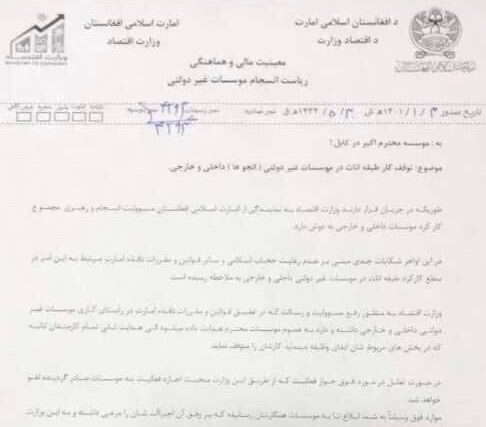UN Assistance Mission in Afghanistan (UNAMA) head Ramiz Alakbarov Monday called for a reversal of the decision to ban women from domestic and international NGO humanitarian jobs, in a meeting with Economy Minister Qari Din Mohammad Hanif in Kabul, Afghanistan. On Saturday, the Minister of Economy (MoE) issued a directive prohibiting domestic and international non-governmental organizations (NGOs) to allow female staff members from working in their organisations. Economy Minister Hanif said that the ban was introduced owing to the series of allegations of non-compliance in wearing the Islamic headscarf (hijab) by the NGO female employees, thereby violating Sharia law.This decision made multiple organizations suspend their operations till they gained some clarity on the directive. A joint statement by the Norwegian Refugee Council, Save the Children and CARE International, mentioned that they “cannot effectively reach children, women and men in desperate need in Afghanistan without our female staff.” A spokesman for the Secretary-General of Kabul, Stéphane Dujarric, shared his deep concern and stated that this “decision will undermine the work of numerous organizations working across the country helping those most vulnerable, especially women and girls.”The International Rescue Committee (IRC) suspended their operations because the organisation is highly dependent on female employees. IRC stated that:The latest decree from the authorities barring Afghan women from working in national and international NGOs, following earlier decrees barring women from attending universities, vocational training, and private institutions will have lifelong impacts on the present and future of Afghanistan. The exclusion of women from humanitarian service delivery will have catastrophic consequences for the Afghan people because our services depend on women workers.Taliban’s decision to ban women from domestic and international NGO jobs comes after the Taliban’s Ministry of Higher Education issued a blanket ban on female students from attending universities in Afghanistan. Human Rights Watch reported that since the Taliban took over Afghanistan in August 2021, secondary schools have reopened only to boys, and women have been prohibited from working in certain sectors, like humanitarian aid and government jobs. Last week, Secretary General’s Special Representative for Afghanistan, Roza Otunbayeva delivered a brief to the Security Council, highlighting the suppression of opposing voices in Taliban rule, and strict restrictions on women from visiting most public parks, bath houses, and gymnasiums. Otunbayea stated that women’s social space is now being restricted as much as their political space.


The Most Read
Сryptocurrencies
Bitcoin and Altcoins Trading Near Make-or-Break Levels
Financial crimes
Thieves targeted crypto execs and threatened their families in wide-ranging scheme
Financial crimes
Visa Warning: Hackers Ramp Up Card Stealing Attacks At Gas Stations
News
Capitalism is having an identity crisis – but it is still the best system
Uncategorized
The 73-year-old Vietnamese refugee is responsible for bringing Sriracha to American consumers
Uncategorized
Electric Truckmaker Rivian, Backed By Amazon, Ford, Raises Whopping $1.3 Billion